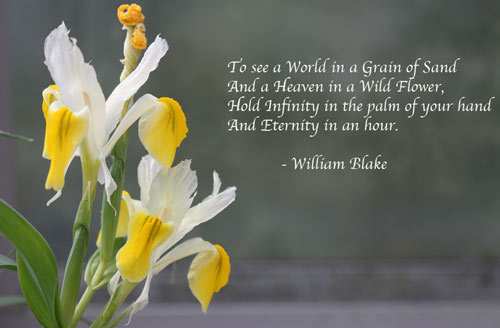William Blake was both a mystic and visionary poet and the poetry of Blake is a reflection of his own inner vision. Throughout his life William Blake composed many poems -far reaching in both their scope and range of experience.
As a young boy Blake had an illumining mystical experience. Throughout his life he maintained this otherworldly quality and most significantly was able to experience and see the divine in and through ‘ordinary’ human experiences. For example in the poem ‘Divine Image’
‘And all must love the human form,
In heathen, turk, or jew;
Where Mercy, Love, & Pity dwell
There God is dwelling too.’
-From: The Divine Image – Songs of Innocence
This ability to see the divine in all is best summarized in Blake’s immortal poem from Auguries of Innocence
” To see a world in a grain of sand
And heaven in a wild flower
Hold infinity in the palm of your hand
And eternity in an hour.”
– from ‘Auguries of Innocence
The poetry of Blake offers the extremes of human experiences, which is richly portrayed in Blake’s poem “The Tyger”. The poem ‘The Tyger was written during the French Revolution and so alludes to the violent and threatening forces of the time. However the Tyger is much deeper than a symbolic commentary. It encapsulates the darkest forces of ignorance which are transcended by the divine, transcendental consciousness which combines both polarities of light and darkness.
” Tyger! Tyger! burning bright
In the forests of the night,
What immortal hand or eye
Could frame thy fearful symmetry? “
– From: “The Tyger” – Songs of Experience
‘The Tyger” is humanity’s invaluable treasure. Here we see that ignorance-energy, which threatens to devour the entire world, finally discovers its transformation-salvation in the realisation of the absolute One. This absolute One embodies both ignorance-energy and knowledge-energy and, at the same time, far transcends them both.’
– Commentary by Sri Chinmoy (William Blake, Philosophy Thinkers)
~
The poetry of Blake covers many different angles and perceptions. Poems from Songs of Innocence are quite unique in their genuine innocence, yet free of overbearing sentimentality.
‘Smiles on thee, on me, on all;
Who became an infant small.
Infant smiles are his own smiles;
Heaven & earth to peace beguiles.’
~
On the other hand In Songs of Experience Blake testifies to the harsh realities of life that can be experienced. For example the poem ‘London is a stark reminder of life in the 18th Century.
“I wander through each chartered street,
Near where the chartered Thames does flow,
A mark in every face I meet,
Marks of weakness, marks of woe.
In every cry of every man,
In every infant’s cry of fear,
In every voice, in every ban,
The mind-forged manacles I hear: “
~
The introductory poem to Milton (commonly called Jerusalem) incorporates some of the best aspects of Blake’s poetry. It is rich in symbolism and the polarities between the ‘darkness’ of the ‘Satanic Mills’ and the promised land of ‘Jerusalem’ ‘ A state of innocence and beauty.
“And did those feet in ancient time,”
Walk upon Englands mountains green:
“And was the holy Lamb of God,”
On Englands pleasant pastures seen
“And did the Countenance Divine,”
Shine forth upon our clouded hills?
“And was Jerusalem builded here,”
Among these dark Satanic Mills?
Blake was a great visionary who saw mystical worlds beyond the ordinary perceptions of many people. For this, many of his contemporaries though of him as insane or at least eccentric. During his lifetime he lived in relative obscurity and was never rich. However with the passing of time the world has come to recognise his poetry as having extraordinary vision and imagination and he is rightly revered as a great Seer Poet.
Often when reading Blake’s poetry we may not be aware or perhaps misunderstand his symbolism and hidden meaning. But the beauty of his lyrical poetry means that doesn’t matter we can enjoy his poetry even without fully ‘understanding’ his prophetic message.
by: Richard

